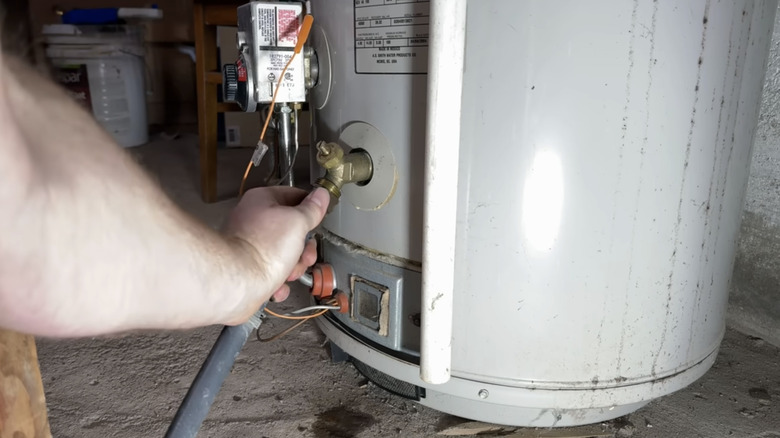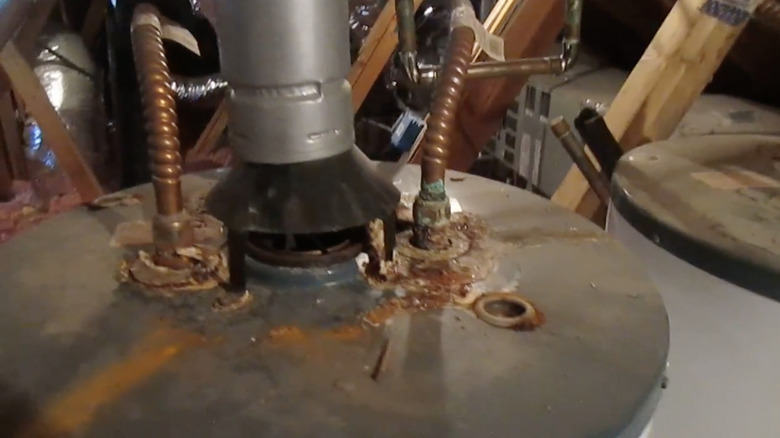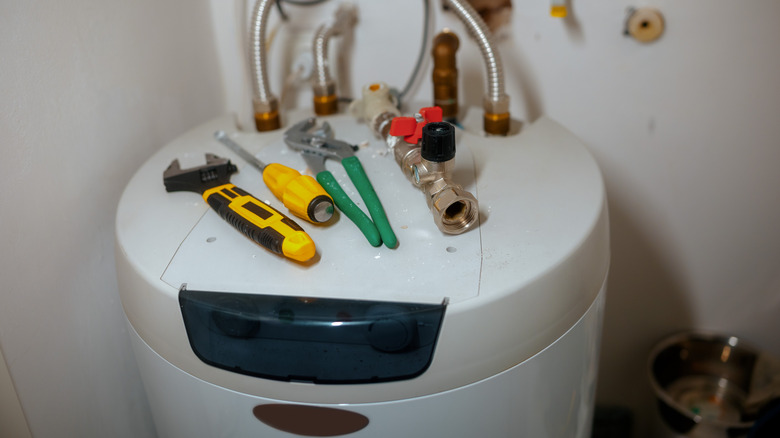Your Water Heater Needs Your Attention To Last Longer And Save You Money
The water heater is designed to be a pretty low-maintenance device. But while it doesn't need constant looking after, some care can save you from that unexpected blast of cold, dirty water when the heater does fail. It can also dramatically improve the life of your water heater — no matter what brand it is — and save you from a big expense down the line. Prevention is, after all, better than cure.
The first thing you need to be mindful of is sediment buildup from all those loose minerals. Sadly, even the cleanest supplied water isn't free from those. Loose minerals turn into gunk at the bottom of your tank, and even a single inch can significantly reduce efficiency – the burner is forced to work harder, and your electricity bills grow longer. Sometimes, that layer even acts as a trap for water. And as this trapped water starts boiling, it tries to escape, resulting in popping or rumbling sounds. The good news is that you can fix this yourself without calling a pro.
One technique, as reported by Fox 13, involves leaving the water supply on while attaching a hose to the tank's bottom drain and opening the valve. This results in a continuous incoming pressure that pushes out sediment more forcefully. Just keep this process up until the ejected water starts looking clear. It may seem like a difficult task if you haven't done it before, but it's something you thankfully only need to perform once a year.
Protect the tank against corrosion
Beyond sedimentation, another major annoyance is corrosion. Water heaters contain metal components, and metal simply doesn't go well with water. To protect against corrosion, heaters come fitted with a stick called an anode that exists solely as sacrificial material. It rusts so that the tank itself doesn't. It needs checking every two to three years, just in case it's done its job a little too well and has rusted to the point it can't go any further. Replacing an anode may require a technician, though.
As this component rusts, it also weathers away and loses thickness. Normally, you'll be able to just tell when it's time for a replacement just by examining it. But if you're on a tight budget and want to push it, just make sure it's not eaten away to a thickness of less than half an inch. At that point, the tank itself may start corroding. While you're at it, make sure to check the pressure relief valve as well. This component essentially acts as an emergency vent for when the steam exceeds safe pressures, preventing the whole unit from blowing up. Just make sure that it snaps back correctly.
Manage usage habits and insulation
If you think about it, the entire world and its elements are working against your poor water heater — rust, gunk, and water itself! Things only get worse when you live in a region with a hard water supply. Hard water typically contains higher calcium and magnesium levels, which translate to scale deposits. And these deposits only accelerate the aging process for the appliance. To prevent this, try installing a water softener.
Sudden drops in temperature are a problem, too, as they can cause the tank to contract quickly, potentially leading to hairline cracks. You can fight against this by wrapping the unit in an insulation blanket. If you're considering that, you can also try insulating the pipes to help the water retain its temperature better.
How you use the tank is also very important. Always make sure you switch the heater off when you're away from home for extended durations. Leaving the heater running at full blast constantly not only leads to faster aging but is also a waste of energy. Some heaters come with a "vacation mode" setting, so ensure you turn it on when away. That mode is also clutch against stagnant water. Moreover, when unused for a long time, the water inside a warm tank can breed bacteria and develop foul odors. Of course, not every heater comes with a setting like that. In that case, LG Home Comfort recommends manually adjusting the temperature to about 50°C (120°F) before leaving.
That said, even with perfect care, no heater lasts forever. Standard tanks generally die after 10 to 15 years, though tankless models might stretch that to 20 years – if you are lucky. So, be realistic about when it is time to upgrade, as water heaters can be expensive.


